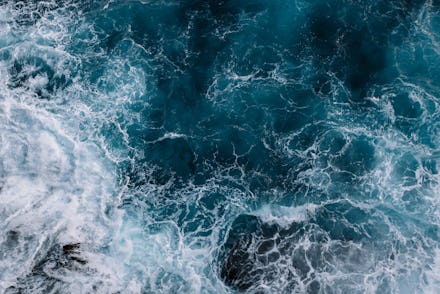Scientists find new evidence for a prehistoric, waterworld Earth

The Earth as we know it is covered in oceans. There's an abundance of life-giving water, of course, but also the land masses we've made our lives on. But the planet wasn't always like this. New evidence suggests that there was actually way more water, in fact, without any continents at all. Imagine, if you will, the entirety of the planet being underwater.
That's apparently the way Earth began all those years ago — without land masses at all, just a massive ocean up until the moment that plate tectonics, or the process which the Earth's surface began moving and shaping itself into the structures we know now, took over. This would mean that a much younger Earth at just 1.5 billion years old or so was devoid of anywhere for use land-dwellers to walk on, and an even bluer planet than we previously thought.
According to the recent study that birthed said watery findings, the first water on Earth could have been carried here by comets rich in ice from outside of our solar system. Alternatively, it could have come in the form of dust from the cloud of particles that created the sun and the rest of our planets just around the time Earth had been formed. Originally, Earth began as a hot magma ocean, with water vapor and gas escaping into the atmosphere.
"It then rained out from the atmosphere as conditions got cool enough," lead study author and assistant professor Benjamin Johnson wrote from the Department of Geological and Atmospheric Sciences at Iowa State University. "We can't really say what the source of the water is from our work, but we do suggest that whatever the source, it was present when the magma ocean was still around."
Johnson and his study co-author Boswell Wing from the University of Colorado Boulder discovered some very interesting things about the sea floor they studied in the Australian outback as part of their research: different isotopes of oxygen that revealed the fact that oceans actually contained more of the oxygen-18 than the oxygen-16 isotope. More of oxygen-16 is found in the modern waters on our planet. But without continents, there would be more of an abundance of oxygen-18. Thus, scientists concluded that there must have been only water — a massive ocean covering the planet.
"This value is different than the modern ocean in a way that can be explained most easily by a lack of emergent continental crust," Johnson told LiveScience.com via email. This isn't a brand-new theory by any means, but it's one that's supported more now by the new discovery and research written out in Johnson's study.
"There are two major camps for the origin of life: hydrothermal vents and ponds on land," Johnson explained of his findings. "If our work is accurate, it means the number of environments on land for life to emerge and evolve was really small or absent until sometime after 3.2 billion years ago."
It's difficult to imagine an Earth any different than the one we're living on now, but the idea of a complete "waterworld" of a planet that so many people live hustling and bustling lives on now is an interesting idea indeed.